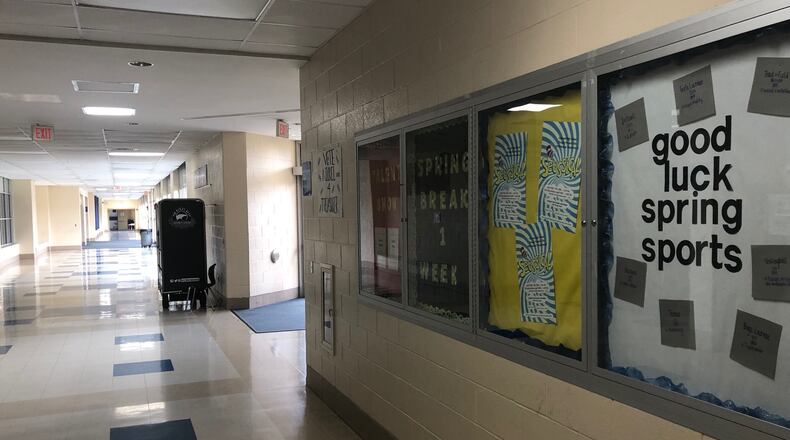When asked if districts may push classes into the summer months, DeWine said some superintendents are concerned that students without internet access will fall behind.
>> Coronavirus: Complete Coverage
“These are things we have to try to figure out as we move forward,” the governor said.
We will have a new order in the next several days. The concern is the same: we have to slow this down and the only way to do it is if people separate. pic.twitter.com/bgSi7KVd76
— Governor Mike DeWine (@GovMikeDeWine) March 30, 2020
DeWine said he is considering another public health order to address social distancing.
The Ohio Department of Health announced 1,933 confirmed cases of coronavirus, including 475 hospitalizations and 39 deaths. The cases are in 70 of Ohio’s 88 counties. Ohio’s multiple hospital systems are working on plans to use convention centers, hotels, dormitories, closed hospitals and other facilities to expand bed capacity and provide resting places for health care workers who don’t want to return home and possibly expose family members.
The Ohio National Guard is overseeing logistics for the hospital capacity expansion, diving the state into eight regions. Region 3 includes Champaign, Clark, Darke, Greene, Miami, Montgomery, Preble and Shelby counties. Region 6 includes the Cincinnati area, including Butler and Warren counties.
Ohio Department of Health Director Dr. Amy Acton said the regional plans are a work-in-progress.
New modeling from the Cleveland Clinic shows that Ohio may see as many as 10,000 new cases per day at the peak in mid- to late-April and Ohio may need to triple its hospital bed capacity.
Ohio’s Congressional delegation fired off a letter to President Donald Trump asking for him to approve DeWine’s request for a presidential disaster declaration for Ohio. A declaration would make Ohio eligible for funding from FEMA.
On Sunday, the state Department of Rehabilitation and Correction reported its first confirmed case of a coronavirus infection. A staff member at Marion Correctional Institution was symptomatic March 25 and tested positive March 29.
>> Coronavirus: Darke County confirms first death, cluster at nursing home
Containing the coronavirus within prisons and jails is problematic since social distancing is difficult. The state of Ohio on Monday moved to dismiss a lawsuit filed last week by an inmate at Belmont Correctional Institution seeking release from prison due to the pandemic.
DeWine announced Monday that Ohio inmates will start making hospital gowns, surgical masks, face shields and hand sanitizer. DRC is awaiting raw materials but workshops behind bars are gearing up now.
Late Sunday, the U.S. Food and Drug Administration gave full approval to Columbus-based Battelle Memorial Institute to deploy new technology that sanitizes N95 respirator masks used by medical personnel so that they can be re-used.
The system uses concentrated, vapor phase hydrogen peroxide to decontaminate the masks. Each self-contained, mobile system can process up to 80,000 masks per day. Multiple units are being manufactured now.
>> Pay it forward: Order 'Joe to Go' for our front-line workers
Equipment will be bar-coded and tracked to make sure each hospital system receives its own masks back and masks will be marked with the number of times it has been processed. Battelle said masks can be sanitized up to 20 times each.
This graph is talking about levels of #PPE - what our hospitals have. The yellow shows critical shortages. We are working to double the current capacity. They need all the increased equipment, staff, and location. pic.twitter.com/K8DWg3KzBE
— Governor Mike DeWine (@GovMikeDeWine) March 30, 2020
Another cascading economic effect to the crisis is expected to erupt soon. Tenants in strip malls and other commercial properties across the state will have trouble paying rent. The property owners, in turn, could default on commercial real estate loans.
The International Council of Shopping Centers is pressing governors to require all regulated banks to offer a 90-day forbearance on all commercial loans in the shopping center industry.
“The non-payment of rent will jeopardize the repayment of up to $1 trillion of secured and unsecured debt held by property owners that underlays the shopping center industry. The subsequent foreclosures would result in empty storefronts and vacant shopping centers across our country, leaving an indelible stain on communities,” the council wrote to the National Governors Association.
Lt. Gov. Jon Husted said the issue is on Ohio’s radar. “We are preparing some action on that.”
RELATED CONTENT:
>> Cities extend income tax filing to match state, feds July 15 deadline
>> Students’ senior years turned upside down by coronavirus closures
>> Coronavirus: Will the pandemic derail Dayton region development projects?
>> Ohio golf courses can remain open after state reverses decision
>> Coronavirus: Battelle gets full approval for mask sterilization


